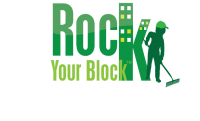
Rock Your Block’s Action Guide
for youth job seekers
Finding a job isn't easy--and finding a job you love can be even more difficult. But don't worry--writing poetry about the job seeking process can help you figure out your dreams and goals. And it can even help you build an awesome resume. This Action Guide is brought to you by the awesome folks at Rock Your Block.
- Build Your Network. Building a network is more than just meeting new people. It’s developing trusted relationships with others that can help you in your job search and preparation for your first (or second or third or fourth) job. You never know if someone could teach you a great interview tip or skill if you don’t ask! A great way to practice developing relationships is to work on your communication skills. For many youth, poetry creates an outlet for exploring ideas and questions that are never wrong and are appropriate for any occasion. If it's different to think about or imagine the kind of job you want or how to find it, a poem is a great first step to getting your thoughts out there. A poem will also ensure that you be yourself because they are your words.
- Indentify Your Skills. Writing a poem can develop skills such as critical thinking, voice, and--best of all--how to own your own writing. Most jobs will require you to articulate ideas, perspectives, and questions. If sales or advertising is something you are interested in, then a poem can help prepare and create a concise and catchy pitch for your audience. Poetry is a writing and speech tool.
- Create Your Resume. Create your resume on Rock Your Block! Login with Facebook or email, then create a username and password. Once you’ve created your account, click on the Resume tab. But remember: resumes look easy to write, but coming up with the right type of language can be difficult. You can use poetry as a way to explore different types of words for your resume. Adventures in Education published 100 Great Resume Words--try using these as inspiration for a poem to explore what these words mean and how they reflect your own experiences.
- Make a Positive Impression and Be Memorble.The best part of in-person interviews is that you can show something extra. Performance Poetry/Spoken Word can build great public speaking skills. (posture in front of an audience, volume, body language, and even how to turn our insecurities into positive avenues).
- You Better (Have) Work...Skills. One of the perks of being a poet is that discipline is developed through the process of completing a poem. A skill many of us have difficulties with is task completion. Taking time to finish a poem to a place of satisfaction and actually working hard on it can help. Poetry writing lends itself to bettering that skill for the rest of our tasks and responsibilities
- Dreams and Goals. Start thinking about and making goals early on—it will help you take the right steps toward landing that one dream job that could change your life. Turning your goals--or your dreams--into poems can help you envision your future success. Poetry is a place for metaphor, creating images to elaborate on thoughts and feelings. Behind a goal there is an emotion--where did it come from and what does it mean?
Additional Resources
How To Ace The 50 Most Common Interview Questions from Forbes.
Job Interview Tips for Teens from About.com.
Sample Cover Letter from Wikihow.
organization:

